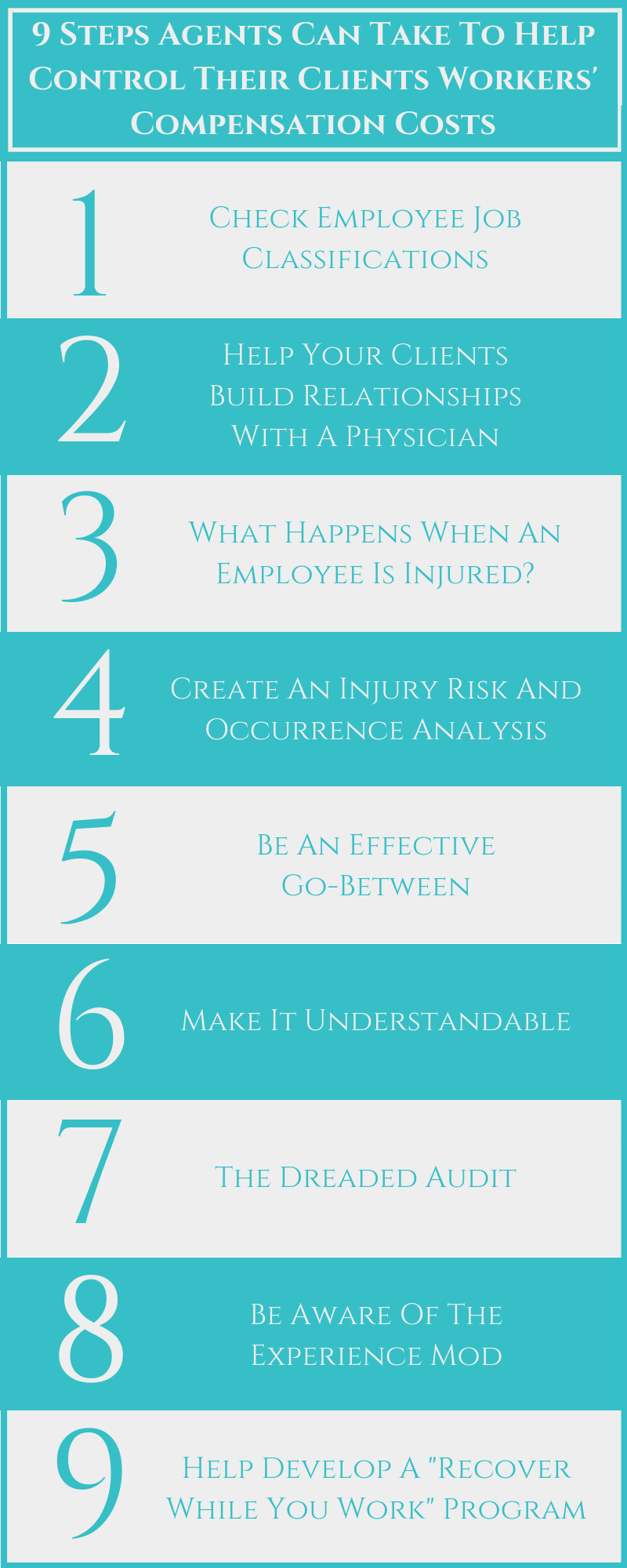08 Nov 9 Steps Agents Can Take To Help Control Their Clients Workers’ Compensation Costs

855-368-5502
9 Steps Agents Can Take To Help Control Their Clients Workers' Compensation Costs
By: Adam Matheny
It seems that for many insurance agents once they sell workers’ comp insurance to their clients, that’s the last time they have anything to do with it. Far too often the only time the subject of worker’s comp comes up is when an employee gets injured. Rather than behaving in this manner, this is where an insurance agent has the chance to shine. Consider these steps you can take to help their clients:
Check Employee Job Classifications
Currently, there are somewhere between 500 and 600 job classifications, making it easy for mistakes to be made. A simple error could move an employee from low-cost job classification to one with much higher premiums. Worse yet, this could continue happening in perpetuity. The agent who finds this error can save their clients a lot of money.
Help Your Clients Build a Relationship with a Physician
In most cases, when an employee is injured on the job, they are taken to the ER, an urgent care center, or their doctor. When this happens, costs can spiral out of control; the employee may take longer to return to work, and more. Taking the time to help your clients find a physician that understands the type of work done by your client’s employees and the kind of business they are in can help significantly reduce the costs of medical care.

What Happens When An Employee Is Injured?
Your role as an agent is to help your clients create a plan of action that ensures injured workers receive the care they need to recover and return to work.
Create an Injury Risk and Occurrence Analysis
Work with your clients to identify areas of high risk analyze the possibility of severe and costly injuries, and what is likely to happen if you don’t make the necessary changes.
Be an Effective Go-Between
Most employers have little to no idea how to effectively communicate with their insurance provider. In most cases, they reach out to their agent for help. Be sure you are ready to provide your clients the help they need, proving your value to them as a go-between.
Make It Understandable
A good agent will help translate all of the technical and legal jargon used by insurance companies into understandable terms. This “secret” language can often be a serious barrier between your clients and their insurance company leading to the risk of increased costs.
The Dreaded Audit
Your job is to help your clients prepare for their annual workers’ comp audit by reviewing payroll records, job classifications, and anything else to do with the audit.
Be Aware Of The Experience Mod
Your job as the agent is to ensure your clients are aware of the “First Milestone,” which is the first time the insurance company is going to report your client’s data to the insurance rating bureau so that it can be included in the experience mod. Typically, this occurs for the first time at 18 months and then annually every year thereafter. The report consists of how much has been paid out for employees’ injuries and how much the insurance company continues to hold in reserve until the employee’s injury has been completely resolved.
Keep in mind that if your clients have a higher mod rating, it could affect their ability to bid on some jobs or exclude them completely. Your role is to ensure all cases that should not be open are closed and that all monies held in reserve are as close to the correct amount as possible.
Help Your Client Develop a ``Recover While You Work`` Program
Finally, you should work with your clients to help them develop a “Recover While You Work” program. This type of program brings the employee back to work in a light or restricted duty status, allowing them to continue being productive and feel valued while they are recovering from their injury.
If you client’s employee can return to work before his worker’s comp wages kick in, the impact to their experience mod is far less negative. In turn, all of this will not only help your clients maintain better control of their workers’ compensation costs, but it will also help you gain their trust and prove your worth as a valuable adviser.

